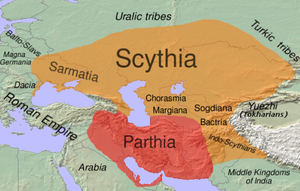| Caesar's planned invasion of Parthia | |
|---|---|
| Part of the Roman-Parthian Wars | |
 | |
| Operational scope | Dacia, Middle East and Central Asia |
| Planned | for 44 BC |
| Planned by | Roman Republic under Julius Caesar |
| Target | Burebista's Dacian kingdom, Parthian Empire, various other states and peoples |
| Executed by | Planned:
|
| Outcome | Eventual cancellation and diversion of Roman forces among civil war parties |
Julius Caesar's planned invasion of the Parthian Empire was a planned war of the Roman Republic against the Parthian Empire. The assassination of Julius Caesar in 44 BC prevented the invasion from taking place.[1]
Following his victory in the Civil War against Pompey and his followers in 45 BC, Caesar's authority was uncontested in the Roman Republic. His next plan was to launch an invasion of the Parthian Empire, the other great power of the period, which had, like the Republic, vastly expanded over the previous two centuries. Caesar sought to avenge the disaster of Carrhae in 53 BC, when the Parthians soundly defeated an invading army led by Crassus. The campaign was to start with the pacification of Dacia, followed by an invasion of the Parthian Empire.[1][2][3]
However, the invasion was cancelled with the murder of Julius Caesar on 15 March 44 BC. In 36 BC, Mark Antony, Caesar's former lieutenant, likewise attempted to conquer the Parthian Empire.
Plutarch also claims that once Parthia had been subdued, the army was to continue to Scythia, then Germania and finally back to Rome.[4] Those grander plans are found only in Plutarch's Parallel Lives, and their authenticity is questioned by most scholars.[5]